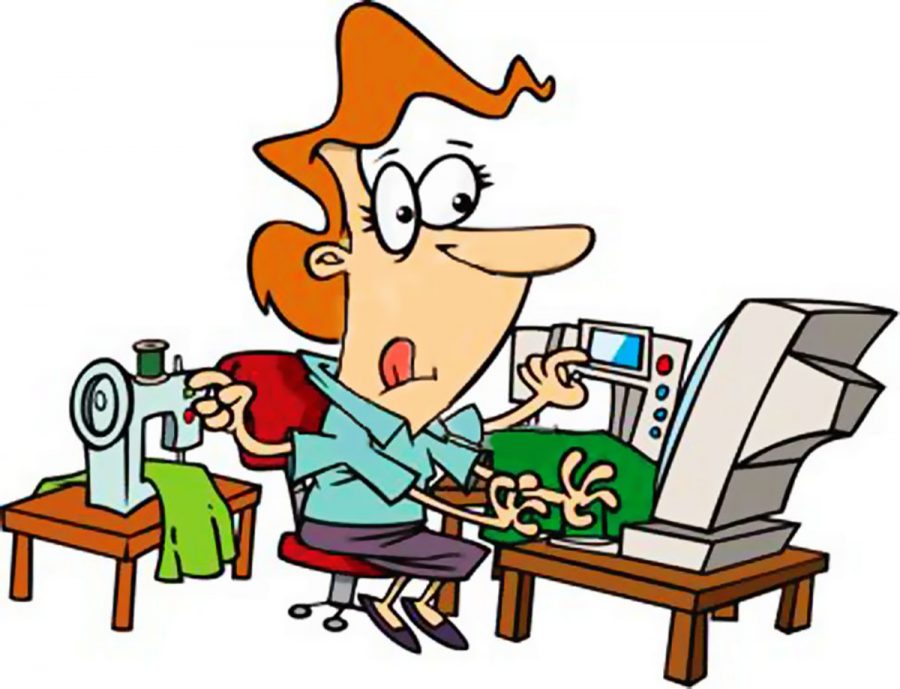“I’m busy”: The negativity tornado
College students say “I’m busy” a little too often, causing mental breakdowns and negativity
More stories from Rebecca Mennecke
Photo by Submitted
Rebecca Mennecke, the managing editor of The Spectator, has a busy life. But, she’s trying hard to stop saying she’s so darn busy all the time.
“I’m so busy.” “I was up until 2 a.m. last night.” “I’m dying, but it’s fine.” If you catch me on the right day, you might hear me say all three of these things within a matter of minutes. If you catch me chugging large quantities of coffee following these statements, you’ll know it has been a particularly rough day for me.
It can be hard to hear other people say, “I’m so busy,” or “I don’t have time for that,” because it feels like a competition for who is living a more stressful, and thereby successful, life.
“It’s a competition that none of us should strive to win,” Carolyn Mennecke, my older sister, said.
I’m guilty of initiating that competition. I’m always telling other people “I’m so busy” and feeling frustrated when they try to convey that they’re busier than I am. I need to cut that common phrase — “I’m busy” — out of my life. It causes way too much negativity in this world for my taste.
Gina Barreca, writing for Psychology Today, described how people nowadays respond to the question “How are you?” with “Busy.”
It’s like we, in the United States, always have something more important to do, more important emails and phone calls to get back to and to-do lists that take precedence over other people.
“We made ourselves feel significant by believing that the busier we became, the more significant we were; the longer our to-do lists were, the more in-demand we were; the more exhausted we are, the more virtuous we must be,” Barreca said.
As college students, it often feels like in order to be valuable or an asset to our community, to our families and to our campus, we have to be involved and busy — sometimes to the point of sacrificing mental and physical health.
Oliver Burkeman from BBC calls it a “busyness epidemic.” Burkeman writes:
“The result, inevitably, is feeling overwhelmed: we’re each finite human beings, with finite energy and abilities, attempting to get through an infinite amount. We feel a social pressure to ‘do it all,’ at work and at home, but that’s not just really difficult; it’s a mathematical impossibility.”
Burkeman goes on to describe how this method of thinking (the “I’m so busy” phrase) causes workers to do poorly on job duties and have lowered feelings of compassion. This busyness can then “infect” our free time by making us feel like we are wasting time by enjoying it.
I can attest to this first hand; every time I hang out with friends, watch a movie or read a book for fun, I feel anxious and panicked because I’m not working ahead in school or working.
“Busy people have mental breakdowns, become emotionally burnt-out, and are routinely manipulated by others,” Isaiah Hankel said in thejournal.ie. “The reason busy people suffer so much is that busyness is a gateway to mediocrity, reduced expectations, and reduced willpower.”
Being too busy, according to Hankel, means “wasting your valuable mental energy” and “giving up on your dreams.”
“People who brag about being busy will always be average,” Hankel said. “They will never accomplish anything great or leave a legacy behind them. These people brag about busyness because nothing else in their lives is worth discussing.”
Did that feel like a punch in the gut to anyone else? This makes me wonder: What kind of legacy am I leaving behind? I want people to view me as kind-hearted, friendly and accessible. When I always say “I’m busy,” I’m conveying that I’m none of those things.
I never want the person I’m chatting with to feel like I’m more successful or more important than they are. Everyone experiences success in different ways. And every single person is important.
I know I’m guilty of trying to feel more important, more busy, more professional than other people. I don’t mean to make other people feel bad about their involvement, their achievements, but I’m sure I often do. It just feels like I’m always racing around while others get to enjoy their lives. The problem is my mindset.
Here are the different ways to respond to “How are you?” that don’t involve saying “I’m busy” (even though you might be):
- I’m working on some really cool projects.
- I had time this weekend to spend with my sister and grab lunch together.
- I got my favorite kind of coffee this morning.
- There was a beautiful sunrise this morning.
- I chatted with a good friend today.
- I reached my step count today.
- I have a long to-do list right now, but I’m really free this weekend
- I’m looking forward to this weekend.
“Saying something like ‘I’m busy,’ ‘I’m tired,’ ‘I’m stressed’ leads to a cycle of negativity,” Carolyn Mennecke said. “And we should focus on sharing the good things in our lives instead of focusing on the bad.”
Mennecke can be reached at mennecre0075@uwec.edu.

